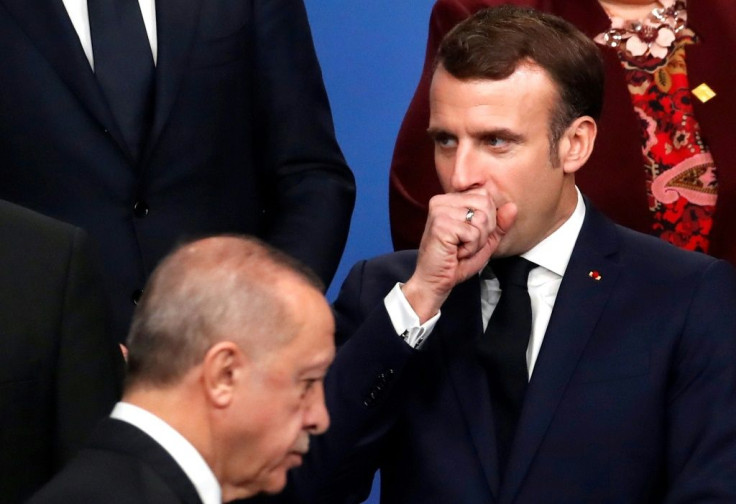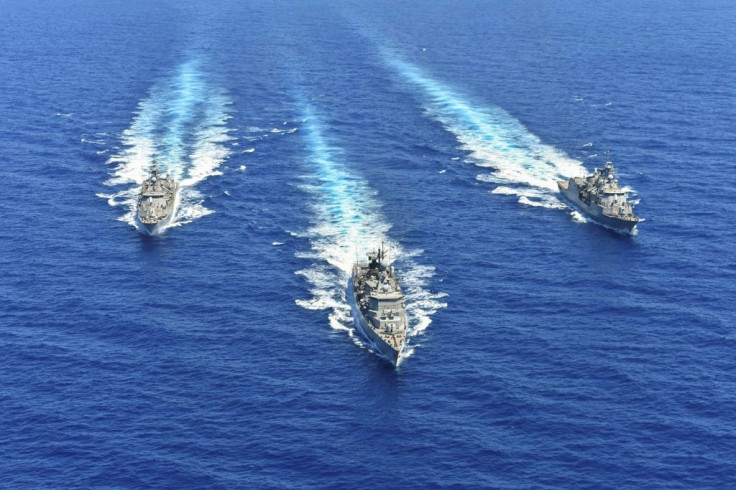Med Leaders Ready For EU Sanctions On 'Confrontational' Turkey
Leaders of seven European countries on the Mediterranean said on Thursday they were ready to back EU sanctions against Turkey if Ankara shunned dialogue on escalating tensions in the sea.
French President Emmanuel Macron hosted the leaders of six other EU states, including Turkey's regional rival Greece, for a summit in Corsica in the hope of finding common ground ahead of the next EU summit this month.
Showing again his anger against Turkey under President Recep Tayyip Erdogan, Macron said before the summit that the NATO ally was no longer a partner in the eastern Mediterranean, and that its people "deserved something" different to the way the government currently behaved.
France has strongly backed Greece and Cyprus in a growing standoff with Turkey over hydrocarbon resources and naval influence in the eastern Mediterranean, which has sparked fears of more severe conflict.
After talks with the leaders of Italy, Malta, Portugal, Spain, Greece and Cyprus in the resort of Porticcio outside the local capital Ajaccio, Macron adopted a slightly milder tone, saying the leaders wanted to reengage in a dialogue with Turkey "in good faith".
But the final statement of the leaders made clear that sanctions were on the table if Turkey failed to end its "confrontational actions".

"We regret that Turkey has not responded to the repeated calls by the European Union to end its unilateral and illegal activities in the Eastern Mediterranean and the Aegean Sea," the communique said.
"We maintain that in absence of progress in engaging Turkey into a dialogue and unless it ends its unilateral activities, the EU is ready to develop a list of further restrictive measures," the leaders said, adding these could be discussed at the European Council on 24-25 September.
The crisis has added to a growing list of tensions between Turkey and Europe, notably over Ankara's military intervention in Libya, its policy in Syria and a crackdown on opponents of Erdogan at home.
"We Europeans need to be clear and firm with the government of president Erdogan, which today is behaving in an unacceptable manner," Macron told reporters before the summit began.
He said that at the moment Turkey was "no longer a partner in the region" of the eastern Mediterranean due to its behaviour.

Macron added that Turkey had "intensified provocations in a way that is not worthy of a great state. The Turkish people are a great people and deserve something else".
But in a strongly worded reply, the Turkish foreign ministry described Macron's comments as "arrogant" and a sign "of his own weakness and despair".
Erdogan's top press aide, Fahrettin Altun, took a swipe at Macron in a tweet, describing him as a "wannabe Napoleon" on a Mediterranean campaign.
The EuroMed 7 is an informal group of EU Mediterranean states, sometimes dubbed "Club Med", that held its first summit in 2016. Turkey is not a member.
Turkey has sought to join the EU for over half a century, though analysts say the growing rift between Erdogan and the bloc's leaders has made the prospect increasingly unlikely.
Macron said that the Mediterranean had become the scene of "a hegemonic game between historical powers seeking to destabilise the region", pointing towards both Turkey and Russia.
There are "real risks of destabilisation in the Mediterranean because of threats from Turkey", said Cypriot President Nicos Anastasiades, calling on the EU to "use all the means" at its disposal to "avoid a catastrophic conflict for the whole region".
"If Turkey refuses to listen to reason... I don't see any choice for my European colleagues except significant sanctions," Greek Prime Minister Kyriakos Mitsotakis, who also held bilateral talks with Macron before the summit, wrote in French daily Le Monde.
Greek media said the possible sale by France of Rafale fighter jets could be on the table, in a sign of the increasingly strong alliance between Paris and Athens.
Adopting a slightly milder tone, Spanish premier Pedro Sanchez said the seven had sent a "clear message" for real dialogue.
"We believe this genuine dialogue is possible, we believe it is possible to follow the path of de-escalation," he said,
© Copyright AFP 2024. All rights reserved.





















